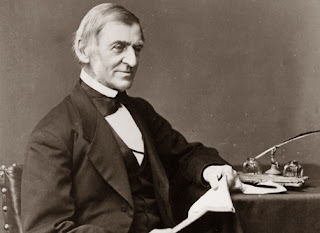An Emersonian Meditation Upon A Line Of Aldous Huxley's

But it is a fact, confirmed and re-confirmed during two or three thousand years of religious history, that the ultimate Reality is not clearly and immediately apprehended, except by those who have made themselves loving, pure in heart and poor in spirit.
~ Aldous Huxley, The Perennial Philosophy, x.
I must confess to a certain irritation when very smart people use their words injudiciously. This irritation is no doubt due to a certain proclivity I detect in myself to injudicious verbiage.
In the present instance, Aldous Huxley shamelessly overstates his case. It is difficult to imagine how one might go about substantiating his claim (or any claim) that (1) there is such a thing as "ultimate Reality," (2) that said Reality has been or can be "clearly and immediately apprehended," or (3) that such clear and immediate apprehension can only be achieved by individuals who have somehow "made themselves loving, pure in heart and poor in spirit." Moreover, while purity of heart and poverty of spirit are lovely epithets, how does one decide what those terms even mean?
Contrary to Huxley, no philosophy worthy of the name consists of such claims but, rather, in their interrogation.
And yet: once the interrogation has been successfully carried out and the inherent weakness of the historical claim exposed, philosophy's work is done. What follows then is the life the philosopher (and non-philosopher) must lead. Put another way, where critical analysis ends, the Great & Holy Experiment begins.
Let Huxley's "fact" be "demoted" (or is it "promoted"?) to a working hypothesis, and let all who wish to clearly and immediately apprehend ultimate Reality make themselves loving, pure in heart and poor in spirit--defining those terms by means of personal example.
Then let us gather the evidence--not to decide the historical question (which will no longer matter) but to measure our own lived proximity to the ideals we claim to espouse.

Nota Bene: The Great & Holy Experiment is not the stuff of the academic discipline of Religious Studies, but of Religion itself. Religious Studies occupies itself with the historical question which only matters because the Great & Holy Experiment remains largely untried. At its best (i.e., most productive), Religious Studies can remind us of this perennial omission; at its worst (i.e., least productive), it pretends that there is no Great & Holy Experiment to try.


0 Comments:
Post a Comment
<< Home